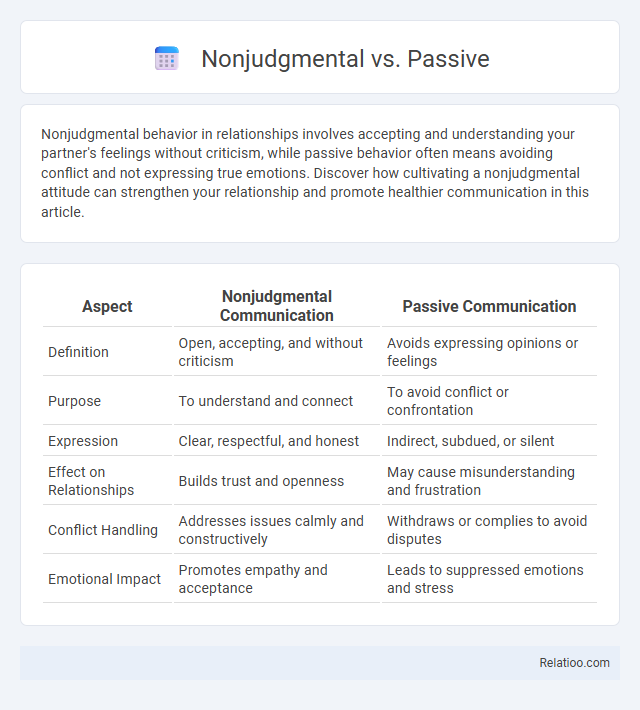Nonjudgmental behavior in relationships involves accepting and understanding your partner's feelings without criticism, while passive behavior often means avoiding conflict and not expressing true emotions. Discover how cultivating a nonjudgmental attitude can strengthen your relationship and promote healthier communication in this article.
Table of Comparison
| Aspect | Nonjudgmental Communication | Passive Communication |
|---|---|---|
| Definition | Open, accepting, and without criticism | Avoids expressing opinions or feelings |
| Purpose | To understand and connect | To avoid conflict or confrontation |
| Expression | Clear, respectful, and honest | Indirect, subdued, or silent |
| Effect on Relationships | Builds trust and openness | May cause misunderstanding and frustration |
| Conflict Handling | Addresses issues calmly and constructively | Withdraws or complies to avoid disputes |
| Emotional Impact | Promotes empathy and acceptance | Leads to suppressed emotions and stress |
Understanding Nonjudgmental and Passive Attitudes
Understanding nonjudgmental attitudes involves recognizing an open, accepting mindset that refrains from forming negative evaluations, fostering empathy and effective communication. Passive attitudes, in contrast, entail avoiding confrontation or decision-making, which can lead to disengagement rather than genuine acceptance. Your ability to distinguish between nonjudgmental openness and passive withdrawal enhances interpersonal relationships and emotional intelligence.
Core Differences Between Nonjudgmental and Passive Behavior
Nonjudgmental behavior involves observing and accepting others' actions or feelings without evaluation, fostering empathy and openness, while passive behavior reflects a lack of response or avoidance of conflict, often leading to unmet needs or suppressed opinions. The core difference lies in engagement; nonjudgmental individuals remain actively present and respectful, whereas passive individuals may disengage or acquiesce to avoid confrontation. Understanding these distinctions is vital for effective communication and healthy interpersonal dynamics.
Psychological Foundations of Nonjudgmental Approaches
Nonjudgmental approaches in psychology emphasize unbiased observation and acceptance of experiences without imposing evaluative labels, fostering emotional regulation and reducing cognitive distortions. Unlike passive attitudes that imply inaction or disengagement, nonjudgmental stances involve active mindfulness and awareness, supporting therapeutic processes such as Acceptance and Commitment Therapy (ACT) and Mindfulness-Based Stress Reduction (MBSR). The psychological foundation rests on cultivating a compassionate self-awareness that mitigates harmful self-criticism and enhances mental resilience through intentional, non-evaluative attention to thoughts and feelings.
The Risks of Passivity in Communication
Passivity in communication often leads to misunderstandings and unresolved conflicts, as individuals may avoid expressing their true thoughts or feelings. Unlike nonjudgmental communication, which involves attentive listening and empathy without criticism, passivity can result in unmet needs and diminished self-esteem. Recognizing and addressing the risks of passivity helps foster healthier interactions by encouraging assertiveness and clarity while maintaining respect for all parties involved.
Benefits of Practicing Nonjudgmental Responses
Practicing nonjudgmental responses enhances emotional intelligence by allowing you to listen openly without bias, fostering trust and deeper connections. This approach promotes self-awareness and reduces stress by preventing automatic negative evaluations, unlike passive behaviors that may involve avoidance or indifference. Embracing nonjudgmental attitudes encourages a supportive environment where individuals feel valued and understood, improving communication and conflict resolution.
Common Misconceptions: Nonjudgmental vs. Passive
Common misconceptions often confuse nonjudgmental attitudes with passivity, yet nonjudgmental behavior entails actively observing without evaluating or imposing opinions, whereas passivity involves inaction or avoidance of engagement. Being nonjudgmental facilitates open communication and empathy by acknowledging others' experiences without bias, while passivity can hinder problem-solving by refusing to address issues. Understanding this distinction is critical in fields like counseling and conflict resolution to foster constructive dialogue and support.
Emotional Impact: How Each Approach Affects Relationships
Nonjudgmental approaches foster emotional safety by encouraging open communication and validation, strengthening trust in relationships. Passive behavior often leads to misunderstanding and resentment, as unexpressed feelings create emotional distance between individuals. Emphasizing nonjudgmental attitudes promotes empathy and reduces conflict, resulting in deeper emotional connections.
Practical Examples: Nonjudgmental vs. Passive in Daily Life
A nonjudgmental approach involves actively listening to others without forming opinions or criticisms, allowing you to create a safe space for open communication and trust. In contrast, passive behavior means avoiding engagement or confrontation, often leading to unresolved issues and miscommunication. For example, when a colleague shares a mistake, being nonjudgmental means empathizing and offering support, while passive behavior might involve ignoring the problem or withholding feedback.
Strategies to Develop Nonjudgmental Communication
Effective strategies to develop nonjudgmental communication include practicing active listening, which emphasizes understanding the speaker's perspective without forming premature opinions. Cultivating mindfulness enhances awareness of personal biases, allowing individuals to respond with empathy rather than judgment. Using open-ended questions and reflective statements encourages dialogue and demonstrates genuine interest, fostering an environment of respect and acceptance.
When Passivity Undermines Growth and Authenticity
Passivity often stalls personal growth by allowing challenges to go unaddressed, whereas nonjudgmental attitudes promote self-awareness without the guilt that hinders progress. Nonjudgmental approaches encourage honest reflection and authenticity, helping You recognize patterns without self-criticism or avoidance. Understanding the difference between passivity and nonjudgmental acceptance is essential to fostering resilience and genuine self-improvement.

Infographic: Nonjudgmental vs Passive
 relatioo.com
relatioo.com